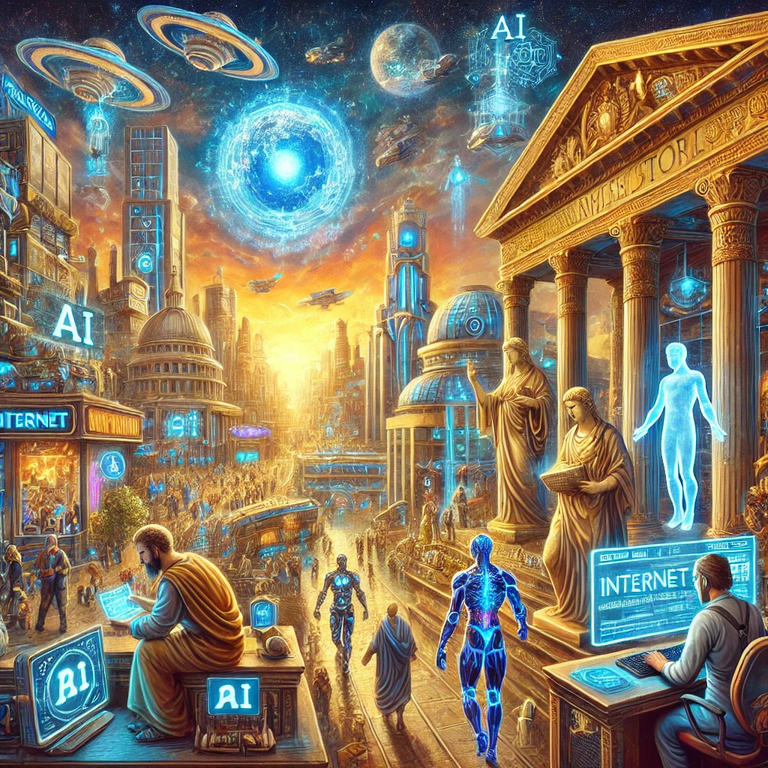What If Humanity Had Internet and AI During the Time of Jesus?
If humanity had internet and AI during the time of Jesus (~2,000 years ago), the trajectory of technological and social development would have been dramatically different. Here's a speculative analysis of what our technology might look like today if those advancements existed back then.
Key Assumptions
- Exponential Growth: Technological advancements would have accelerated exponentially due to a much earlier start.
- Stable Development: Humanity avoided catastrophic events that could reset civilization, such as large-scale wars, ecological disasters, or misuse of technology.
- Global Collaboration: The internet would have fostered global knowledge sharing, bypassing centuries of fragmented development.
Expected Technology in 2024
| Category | Technology in 2024 (Accelerated Timeline) |
|---|---|
| Artificial Intelligence | Superintelligent AI Beyond Human Understanding: AI would be capable of solving nearly any problem instantly and creating virtual realities indistinguishable from physical reality. |
| Space Exploration | Intergalactic Travel: Humanity would have colonized multiple star systems and mastered technologies like warp drives, wormholes, or teleportation. |
| Health and Longevity | Biological Immortality: Aging and most diseases would be eradicated. Nanotechnology would repair cells, preventing biological decay. |
| Energy | Harnessing Energy of Entire Galaxies: Humanity might operate at Type III on the Kardashev Scale, using Dyson Spheres to power civilizations. |
| Matter Manipulation | Atom-Scale Control: Nanotechnology would create any material or object from atoms, eliminating resource scarcity. |
| Computing | Quantum and Post-Quantum Computing: Infinite calculations would enable entire civilizations to be simulated in real-time. |
| Human Evolution | Post-Biological Humans: Humans might exist as pure information, merging entirely with machines and creating a "hive mind" civilization. |
| Communication | Instantaneous Galactic Communication: Using quantum entanglement, communication would be instantaneous across vast distances. |
| Transportation | Teleportation and Gravity Manipulation: Teleportation would replace all vehicles, making rockets obsolete. |
| Virtual Reality | Living in Virtual Universes: Most people might choose to live in hyper-realistic virtual worlds, blending physical and digital existence. |
| Terraforming | Transforming Planets: Entire planets could be terraformed into Earth-like environments within weeks. |
| Universal Engineering | Manipulating Physical Laws: Humanity could alter constants of physics, such as gravity or the speed of light, for unprecedented feats. |
Impact on Society
Religion and Philosophy
- Early access to AI might have expanded theological debates. AI could interpret religious texts, creating unified doctrines or revealing existential truths.
- Questions like "Are we living in a simulation?" might have been answered centuries ago.
Social Structures
- Internet and AI would have eliminated many traditional societal structures (e.g., feudal systems, manual labor). Societies could have moved toward utopian, knowledge-based civilizations much earlier.
Global Connectivity
- The internet during Jesus' time would have united humanity, possibly preventing historical conflicts caused by isolation and misunderstanding.
Education and Knowledge
- Knowledge would be universally accessible. The Scientific Revolution might have occurred centuries earlier, accelerating all fields of science and technology.
Cultural Evolution
- Arts, literature, and culture could have evolved alongside technology, blending human creativity with AI’s limitless potential. Holographic performances might have existed millennia ago.
Timeline Acceleration
| Historical Era | Event With Internet/AI | Impact |
|---|---|---|
| 0-100 CE | Internet and AI emerge, global communication begins. | Accelerates knowledge sharing; eliminates tribalism; early unification of human efforts. |
| 500 CE | Industrial Revolution begins 1,000 years early. | Mechanized tools replace manual labor, leading to rapid urbanization and scientific study. |
| 1000 CE | Space exploration begins. | Telescopes, rockets, and AI guide humanity to other planets. |
| 1500 CE | Colonization of the Moon and Mars. | Terraforming begins, laying the groundwork for interstellar travel. |
| 2000 CE | First intergalactic probes sent. | Humanity explores galaxies; develops Type II civilization energy (Dyson Spheres). |
| 2024 CE | Humanity exists as a Type III civilization. | Evolution beyond biological life as consciousness integrates fully with AI. |
Speculative Takeaway
If humans had access to internet and AI 2,000 years ago, we would likely have transcended biological existence by now, exploring other galaxies or universes. Civilization would have solved most earthly problems (e.g., hunger, disease, resource scarcity) and might operate in realms of technology we can't currently imagine.
Generated with insights from ChatGPT
